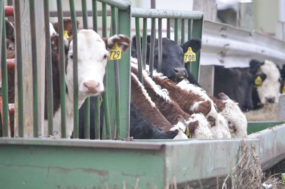
Sweden
Last year, the average Swede consumed nearly 40 pounds of meat – with beef and veal being the most consumed.
Marit Paulsen, a Swedish member of parliament and vice president of the European Parliament’s agriculture committee, said she would prefer the Swedish meat consumption to shrink to 20 to 25 pounds per person per year, which was the level 20 years ago.
She says nutrient runoff and pesticide use in agriculture is influenced by the amount of meat consumed.
Paulsen notes that reduced nutrient runoff and reduced pesticide use can also be achieved by improving production methods at the farm level.
Swedish authorities suggest that consumers can contribute to sustainable food production by avoiding the meat that is worst from a sustainability perspective.
They say labeling is one way to make it easier for consumers to choose meat that is more sustainable – and contribute to positive environmental impacts from meat production.
They acknowledge that grazing animals are required in order to preserve Swedish semi-natural pastures. These pastures are important for biodiversity and rural landscapes.
However, particularly for beef, there is a conflict of interest between preserving pastures and jobs and reducing greenhouse gas emissions.

Brazil
With global shortages of feed grains, now comes word that Brazil is set to produce a record soybean crop.
Brazil’s soybean crop could reach as high as 85 million metric tons (MT) this season, up 27 percent on the year before.
But in a country sorely lacking in grain transportation and export infrastructure, ships are lining up at ports well ahead of harvest.
As many as 126 vessels were scheduled to load 6.2 MT of soybeans and corn through the harvest crush, according to Bloomberg reports – that’s well up from 72 ships carrying 2.8 MT at the same time last year.
This jump is expected to put enormous pressure on Brazil’s overstretched roads, highways and ports. As a result, delays of 45 days and more are expected at the principal exit points of Santos and Paranagua.
In an attempt to get ahead of the crowd, global buyers are sending ships to port early, according to local trading desks.
But this strategy has been partially blunted by big line-ups for corn shipments stretching back to February – as exporters try to ship new-crop corn before the bulk of the soy arrives.
It’s a very tight situation, and one that could deteriorate if rain comes to delay loading. Covered-port grain storage facilities are virtually nonexistent in Brazil.
The port issue is only one part of the logistical challenge facing Brazil’s grain industry this year. The explosion of soybean production in Brazil’s remote interior, combined with a lack of river and rail transport options and a scarcity of trucks come harvest time, has caused Brazilian transport rates to skyrocket.
Transportation rates to port have jumped from $1.20 per bushel of soy in 2003-2004 to $2.48 per bushel in 2011-2012, according to Andre Pessoa, director of Agroconsult, a local farm consultancy.
And a radical leap in rates is forecast for this season. Piled on top of other problems, it’s estimated that Brazil will see a shortage of approximately 50,000 truck drivers.
Road freight rates will rise by 34 percent this season, predicts the Sao Paulo Shore Cargo Haulage Union. The principal culprit is new legislation that limits truckers to 11-hour days and demands that they take a break for half an hour every four hours, but a 5.4 percent increase in the price of diesel will also play a part.

Germany
German officials have vowed tighter controls on meat products and stronger penalties for companies that violate food-labeling rules.
This comes in the wake of a scandal where food items marketed as “all beef” were pulled from supermarket shelves after testing positive for horsemeat.
Consumer Protection Minister Ilse Aigner and her state counterparts announced a 10-point plan seeking to allay Germans’ fears after five national supermarkets recalled lasagna, chili, tortellini and goulash – all with traces of horsemeat.
Most recently, German discount supermarket Lidl announced recalls of Combino brand “Beef Tortelloni” sold at its stores in Austria after tests showed it contained horsemeat.
Aigner says Germany will step up testing and be looking for any meat not clearly noted on the label – not just horse. “I can’t say this is the end,” she told reporters. “We have to count on other cases being discovered.”
Horsemeat has turned up across Europe in frozen supermarket meals such as burgers and lasagna, as well as in beef pasta sauce, on restaurant menus, in school lunches and in hospital meals.
Millions of products were pulled from store shelves in Britain, Ireland, France, Spain, Germany, Denmark, Sweden and Norway after the scandal broke, and supermarkets and food suppliers were told to test processed beef products for horse DNA.
European officials say the scandal is the result of fraud and possibly an international criminal conspiracy to pass off cheap horsemeat as more expensive beef.

France
France agreed on Feb. 25 to partially restore the health certification of a meat seller at the heart of the horsemeat uproar.
In a decision just ahead of a meeting between French government officials and workers at the Spanghero company, French Agriculture Minister Stephane Le Foll says he would allow it to resume production of ground meat, sausages and some cooked goods after inspectors found nothing amiss there over the weekend.
However, frozen goods, which were the center of questions over whether Spanghero officials deliberately passed off horsemeat as beef, remain off limits for the company.
The French government has said the chain of fraudulent meat sales reaches across 28 firms in 13 countries. At least some of the horsemeat originated at abattoirs in Romania and was sent through a Cyprus-registered trader to a warehouse in the Netherlands.
Spanghero bought the meat from the trader, then resold it to the French frozen food processor Comigel; it was then marketed in other countries. ![]()
Clint Peck is former director of Montana’s Beef Quality Assurance program.







